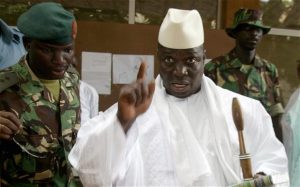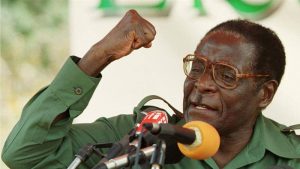
 Who Bewitched Us? When will the rain stop beating us?
Who Bewitched Us? When will the rain stop beating us?
Rather than Strong Men, Africa needs Strong Independent Institutions and Visionary leaders.
by Alagi Yorro Jallow.
Part III
Fatoumatta: Africa is a continent of winner takes all in everything. A continent full of political leaders of extremes in riches and poverty; a continent of extremes in power and powerlessness. A cold-blooded continent of the well-fed not knowing that anyone else lacks. Furthermore, an African union of governments appears to be a litter bin of big and small dictators and aspiring dictators. Even we, the governed, are so used to the perfidy around us that we see no reason to hate evil and its high priests. When pro-democracy war raged, and protesters were falling in Washington DC, in the Palace of Westminister and parts of the United Nations Dag Hammarskjold Plaza in New York. The Élysée Palace in France, when the African’ protest for strong institutions suffering and people gladly embraced the pain, could the combatants have imagined good governance driven by a strong institution, not strongmen. Would it be a lot at the end of the tunnel?
Fatoumatta: Whether under the military or the civilian, the architecture of African nationalism and independence from colonial bureaucracy has remained largely exclusionary and, even, reactionary—those who reign rule for themselves and themselves alone. The system of governance, which created it, further waters it with torrents of impunity. The system suffocates patriotism and elevates triumphal, parochial sentiments. It has unapologetically been serving the interest of, only, the (economic and political) landlords of the moment. Moreover, because it does not care who dies or who is dying, there is perpetual tension in the continent.
Former US President Barack Obama in his first official trip to Africa, in Ghana July 2009 addressing the Parliament of Ghana in Accra, where he counseled Africa to concentrate on building strong institutions instead of relying on strong men/women. Barack Obama stated, “Africa does not need strongmen, it needs strong institutions.” Whereas this admonition was channeled against the scourge of oppressive dictatorial governments that plagued Africa after the end of colonialism and oversaw the mismanagement of the fortunes of the continent.
Fatoumatta: In a 2010 article, Greg Mills, the director of the Brenthurst Foundation based in Johannesburg, South Africa, said sub-Sahara African countries suffer because they have refused to grow and think since independence. They grieve and do nothing and would rather blame their gods or the old, ugly colonialism and new colonialism for their ailments. He said: “while other developing countries and regions have grown over the past 50 years, much of Africa has stagnated. African leaders have become adept at externalizing blame, holding others responsible for Africa’s failings. However, African leaders—not a lack of capital, access to world markets, or technical expertise—are to blame for the continent’s underdevelopment.” Think of all the ugliness around and about the confused rent-seekers and takers pretending to be running our country.
Fatoumatta: In this decade, the new generation of African leaders has an opportunity to turn the tide of the African continent and actualize the dreams of our founding fathers if we make the right choices. They have the privilege of presiding over good governance by building strong institutions as well as strong leadership at the turn of the decade, one hundred years from the rise of African nationalism. A rare opportunity has been thrust upon our leader’s shoulders to make history in the service of Mother Africa. Therefore, this decade, which coincides with the last two years of President Adama Barrow’s administration and maybe extending his term of office, must take the opportunity to build a legacy that will facilitate the emergence of the new Gambia of her dreams. In this regard, Adama Barrow must be focal to drive good governance and exemplary leadership in the appropriate balance, besides, be driven by strong leadership and building strong institutions.
Fatoumatta: A strongman is different from a strong leader. The dictionary definition of a strongman is “a leader who rules by the exercise of threats, force, or violence.” The likes of Sudan’s Omar Hassan al Bashir, Zimbabwe’s Robert Mugabe, Uganda’s Idi Amin Dada, Zaire’s Mobutu Sese Seko, the Gambia’s Yahya Jammeh, Museveni of Uganda – these were strongmen. While some of them played notable roles in freeing their countries from colonial rule, their records of governance leave little to be desired. However, Africa does need strong leaders; Africa needs men and women who will build strong institutions and driven by exemplary leadership.
Look at Robert Mugabe, who died at 95. He made 200 hefty heaps with his youthful hands, but once in power, he, with his muscular legs, scattered them all. He was a hero. He was a villain. He was a god. He was human. His life was a mirror image of Africa and its leadership. In Africa, we aim high and shoot low – almost always. Now that Mugabe is dead, maybe we should use his death to ransom Africa out of its life of sit-tight misfortunes and contradictions.
Fatoumatta: When he turned 93 in 2017, we mused on President Mugabe and linked his trajectory to that of his country. Elegies are therapeutic sometimes, especially when strung with surgical refrains. To push the old, cold points about Africa and its never-ending dreams. Robert Mugabe was Africa, full of promise and potential at the beginning. He was celebrated and venerated. He was selfless and was a real patriot. He did well and was well accepted. He was his people’s own Mandela until he sold his soul to the gods of greed. Out of his 95 years, he spent 11 in jail fighting for his people. Of the remaining 84 years, he was in power for about 38. His wife announced in 2017 that if he died before the next election, his corpse would contest and win! Same with the next and the next elections.
Fatoumatta: However, for his friends who yanked off his fingers from the honey pot, the grand old comrade did not say he was tired of eating. It is the black man’s curse. What have we not seen? Every messiah has turned out a more sinister clone of the devil displaced. For example, in the Gambia Yahya Jammeh, he and his league of benevolence turned malevolence dictators; they always come in sprightly but would always run out under hails of insults. A journalist, Heidi Holland, gave Mugabe a dinner when he was released from prison in 1975. She saw a shy, tense, fiery freedom fighter with audacious ideas. Thirty years after, she met him again and came up with a sad, scary close-up picture of a “freedom fighter who became a tyrant.” She came up too with a conscience burdened by the fact that she, like other journalists in the continent, helped nurture the monster that wrecked her country. No lesson has been learned –even now.
Fatoumatta: We do not believe we are limited by the choices we make in polling stations, in boardrooms, and on the streets. We get shocked, preferably, by evil spirits as they seize the soul of our messiahs. In the Gambia, we always manage to deceive ourselves, walking into the ambush of power. We celebrate the sack of our Lucifer and end up handing over to Satan. Mugabe’s wife suggested Zimbabweans a few years ago before the demise of Mugabe that African presidents do not die; a corrupt or corrupted populace frames their effigies and sits them on the throne. Dynasties of misfortune inhabit palaces of power to the black man’s eternal damnation.
Fatoumatta: Robert Mugabe was an African. Africans do not climb down from a horse – any horse – even after the deed is done or the road is closed. In Africa, it is a misfortune to become yesterday’s horseman. Even when death yanks the African off the saddle, he climbs back like a Joseph Kabila did after a Laurent Kabila left in the Congo.
Mugabe was Africa, a consummate contradiction. An immensely gifted, well-read man with seven genuine university degrees, Robert Mugabe, came a long way, just like the story of the black man. He represented promise and disappointment, hope and hopelessness, hero and anti-hero. He saw good and bad times. He was in and was out of jail. He became president and started flinging his ‘haters’ into and out of jail. He saw poverty, then riches. Power is sweet, especially if you live all your life wielding its sword. President Mugabe represented the very affliction that has wrecked Africa. Robert Mugabe was a hero. He was a villain. He was a god. He was human. He found his reason for living – and tragically lost it. He was Africa. He was a fallen angel.
Fatoumatta: Therefore, providing strong leadership must be the first pivotal agenda of President Adama Barrow’s government in the next two years. Providing strong leadership means determining the most pertinent objectives of nation-building and, like a laser beam, converging all the energies of state onto those critical areas. It means results-oriented governance in which people, policies, programs, and processes are retained in government only to the extent that they contribute to productivity. It means now, more than ever, is not just the Commander-in-Chief but also the Unifier-in-Chief of an increasingly fragmented and disillusioned populace; to offer hope, inspiration, compassion, and pathways to new possibilities; to invoke the spirit of unity, faith, peace, and progress codified in our Coat of Arms.
Fatoumatta: Strong leadership also means accepting dissent and listening to contrarian views while making decisions in the best interest of the Gambian people. To cultivate strong leadership, the leader must surround himself or herself with the best, brightest, and most competent, particularly those who are more intelligent than oneself. The leader must also be willing to take the blame for failure and share the credit for success. Very importantly, providing strong leadership means that the Gambia government must be ready to confront the true enemies of our nation headlong and to free the Gambian people from the grip of her oppressors. We must stop calling treasury looters generous and noble. They are not. They are economic terrorists and the true enemies of the Gambia.

